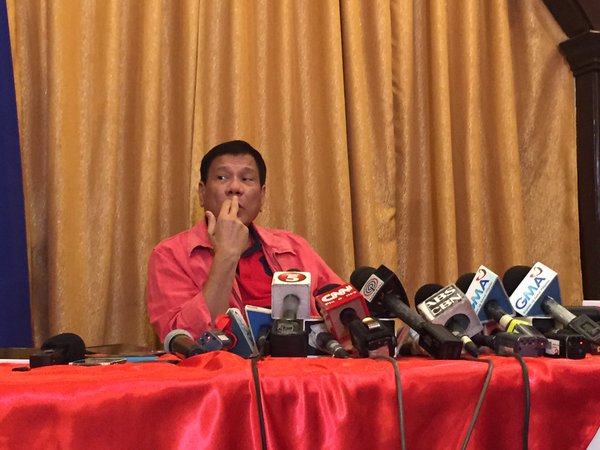
Presumptive President-elect Rodrigo Duterte faces the media in a late evening press conference which lasted until the wee hours on Thursday. ARIES JOSEPH HEGINA/INQUIRER.net FILE PHOTO
As the public is getting used to the obscene language used by President-elect Rodrigo Duterte, how should news agencies report the coarseness of the Davao City mayor without offending the sensibility of their audience or readers?
Much has been published about how the trash-talking incoming President would resort to vulgarities either to banter or to attack his critics. The media would normally censor or use euphemisms for his words so as not to commit impropriety.
READ: ‘Don’t fuck with me,’ he tells media
The Associated Press (AP) Stylebook, one of the widely used English grammar style and usage guides worldwide, suggests confining the offending language, in quotation marks, to a separate paragraph that can be deleted easily by the editors.
It added that it may be better to replace the offensive word with a generic descriptive in parentheses, eg., (vulgarity) or (obscenity).
“Obscenities, profanities and vulgarities must not be used unless they are part of direct quotations and there is a compelling reason for them,” the AP Stylebook states.
Obscenity is a material which tends to deprave or corrupt those whose minds are open to such immoral influences, while profanity is something which treats something sacred with irreverence or abuse. Vulgarity is lack of refinement in conduct or speech.
Meanwhile, The New York Times Manual of Style and Usage states that the approach of using of such words must be dignified and the vocabulary clinical rather than coarse.
“In these situations, writer and editors avoid evasiveness and euphemism, which would be a disservice to readers who need to understand issues,” the New York Times Stylebook states.
It added that editors should consider using the terms if the precise nature of an obscenity, vulgarity or other offensive expression is essential to the reader’s understanding of a newsworthy event and not merely to convey color or emotion.
Likewise, in the Inquirer, its general guideline on the use of questionable subject or explicit language is that the news event must be significant and the questionable material must be essential to the story.
“The general rule: Do not use obscene, profane or vulgar terms in a story unless they are part of direct quotations and there is a strong, compelling reason to use them,” the Inquirer Manual of Editorial Policies states.
Thus, one of yesterday’s headlines read “Don’t fuck with me, he tells media,” which tells about Duterte daring those who were calling for a boycott of his press conferences not to cover him.
Sources: AP Stylebook, The New York Times Manual of Style and Usage and PDI Manual of Editorial Policies
RELATED STORIES
Duterte warns media; no apologies
Boycott Duterte’s press briefings, media watchdog urges PH journos